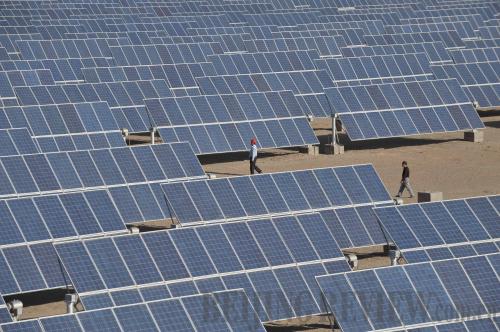|
 |
|
ENERGY FROM THE SKY: Staff members check equipment at a grid-connected solar power generation system in Dunhuang, northwest China's Gansu Province (CFP) |
The EU is China's largest trade partner. In 2012, bilateral trade totaled $546 billion, accounting for 14.1 percent of China's total foreign trade. China's exports to the EU amounted to $334 billion, while its imports totaled $212 billion. In the first five months of 2013, bilateral trade totaled $214 billion, down 2.8 percent, according to the General Administration of Customs.
China has a number of countermeasures in store that can be used as leverage for future negotiations. Hours after the EU's tariffs announcement, China announced that it would launch an anti-dumping and anti-subsidy investigation into wine imported from the EU, a move believed to be retaliatory in nature.
Chinese imports of European wine rose 60 percent on average a year by volume from 2009 to 2012. Last year, China imported 25.7 million liters worth $1 billion from the EU, mostly from France, Spain, Italy and Germany. It accounted for 67.6 percent of China's total wine imports, according to the MOFCOM.
"Although the trade volume of wine is far less than the over $20 billion trade volume of solar panels, it has far-reaching significance to some European countries, such as France and Italy, who supported the anti-dumping tariffs on Chinese solar panels. Besides, the wine industry has a long industrial chain and yields a much higher profit margin than the PV sector," said Bai Ming, a researcher with the Chinese Academy of International Trade and Economic Cooperation.
Qian Jing, Director of Global Branding at Jinko Energy, a Chinese PV maker, said that this trade dispute has gone beyond the control of Chinese PV makers.
"The Chinese Government should step up and do something. Otherwise, it will be the start of a nightmare. If the EU gets whatever it wants by alleged anti-dumping, any country can learn from the EU to harm Chinese companies with tariffs. We don't want retaliation or a trade war. We only hope the Chinese Government can actively seek constructive dialogue and consultation with the EU," Qian told Securities Daily.
Miao Liansheng, Chairman and CEO of Yingli Green Energy, China's biggest PV maker by sales revenue, echoed Qian.
"Punitive tariffs—no matter at what level—will inevitably lead to higher prices for solar products, which will bring about the stagnation of the solar industry in Europe. We therefore encourage the prompt resumption of talks between China and the European Commission," Miao told Beijing Review.
Li Junfeng, Deputy Director of the China Renewable Energy Society, said the EU sent a signal by dividing the tariff into two stages.
"As long as the two sides are willing to sit down to talk, it means they have room for reaching a settlement," said Li.
A source close to the matter told Economic Information Daily that it was essential to reach a settlement before August 6. "Right now, the situation is quite complicated. The EU wants to set barriers both in terms of export prices and export quotas on China's PV products. It's definitely going to be a tough negotiation," said the source.
EU to get hurt
There has been a huge divide of voices inside the EU toward the tariffs. For tariff opponents, there are more things at stake than just the one issue. They want win-win reciprocity rather than a trade war that's doomed to hurt both sides.
A total of 18 EU member states, including Germany, Belgium, and the United Kingdom, oppose the commission's plan to impose hefty tariffs on solar products imported from China. The European Commission may not succeed in its bid to maintain the tariffs because it'll need approval from most EU member states.
For solar panel developers and installers in Europe, they are also opposed to the tariffs, believing that duties would only increase the cost for solar energy and lead to a shrinking of the PV market.
The cost of solar power generation is cheaper in some regions of Europe because solar systems were built with low-cost China-made PV products. But if the price of Chinese products rises, the cost of solar panels will increase and demand from consumers will decrease, which runs counter to the continent's determination to better tap solar energy.
Duties of 20 percent would cost the European economy up to 175,500 jobs and 18.4 billion euros ($24.44 billion) in added value over the next three years. Duties of 60 percent would cost 242,000 jobs and 27.2 billion euros ($36.13 billion) in added value in the PV sector, according to Prognos, an independent European economic research institute.
That's why Alliance for Affordable Solar Energy (AFASE), a Brussels-based coalition of more than 600 European PV companies, is strongly opposed to the EU's decision. It says the move will take a heavy toll on the PV industry in Europe.
| 